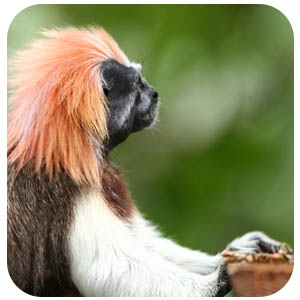
Proyecto Titi
Plights facing the Cotton-Top Tamarin include habitat loss, hunting by local populations, and importation into the United States for biomedical research. The species is now listed as critically endangered and exportation has been banned.
We work with field organization Proyecto Titi to continue the great work they’ve done in the tamarins’ native habitat of Colombia. Project work includes: educating natives on how unique the tamarin is to increase pride in local biodiversity, training locals in how they can help protect tamarins, research on wild tamarin behavior and health, and addressing local pollution while also reducing poverty.
When you donate to conservation at the zoo, those donations help continue the great successes Proyecto Titi has accomplished!
Click here to learn more about Proyecto Titi.
Watch an example of the field research they conduct: tamarinvideo
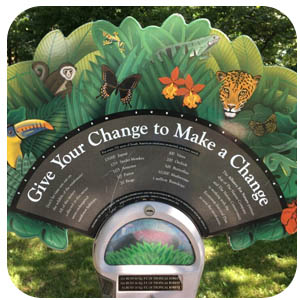
Rainforest Meter
Have you seen our rainforest meter at the Zoo? When you donate to the rainforest meter, the money goes towards adopting acreage of land an an acre of ocean. The land helps save the species of threatened rainforest, and the ocean helps protect coral reefs!
To learn more about this program, visit savenature.org.
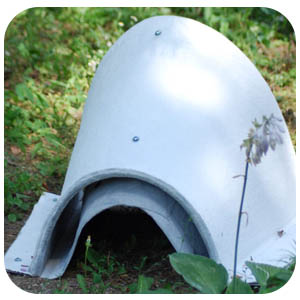
SAFE
Saving Animals From Extinction (SAFE) is a program through the Association of Zoos and Aquariums (AZA). SAFE brings together AZA facilities from around the world to raise awareness and help protect threatened and endangered animals.
African Penguins were one of the four original SAFE species, and we’ve been working hard to promote what AZA facilities are doing to save them from extinction. One of the projects we’ve donated to is the African Penguin Nest Project which helps populations of African Penguins that have had their nesting sites destroyed. Artificial nests (as seen in the picture to the left) help African Penguins succeed despite external pressures such as egg poaching, oil spills, and global climate change. Several of these nest boxes are on display by our penguin pool. Click here to learn more about the African Penguin Nest Project, and what you can do to help.
The Zoo is also looking to get involved with other SAFE species, so keep an eye out! Next time you visit our Zoo, ask a staff member about the SAFE logo on the back of our penguin pool!
Download these FREE apps to help save penguins and other animals and habitats in need:
Monterey Bay Aquarium Seafood Watch App
Cheyenne Mountain Zoo’s Palm Oil App
Click here to learn about how AZA facilities are working to Save Animals From Extinction!
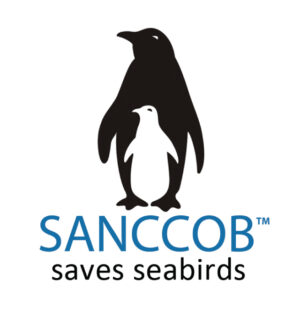
SANCCOB
Based in Cape Town and Port Elizabeth, the Southern African Foundation for the Conservation of Coastal Birds (SANCCOB) has worked to reverse the decline of seabird populations since 1968. Volunteers, interns, and other professionals travel to South Africa each year to assist in the rescue, rehabilitation, and release of these animals. They treat an average of 2,500 sick, injured, oiled, and abandoned birds annually, with the endangered African penguin accounting for roughly 1,500 of their annual numbers. They rehabilitate an average of 24 different species of seabird each year including, cormorants, albatrosses, gannets, petrels, pelicans, gulls, oystercatchers, and more. They have admitted and treated close to 97,000 seabirds since they first began.
In addition to rescue, rehabilitation, and release, SANCCOB monitors seabird nests and habitats, rears chicks, conducts research, offers education programs, provides training, and has a oiled wildlife preparedness response program.
The Saginaw Children’s Zoo has sent two of our African Penguin keepers to SANCCOB as part of their keeper exchange program. We also donate to their efforts annually through our Conservation Fund.
Click here to learn more about SANCCOB.
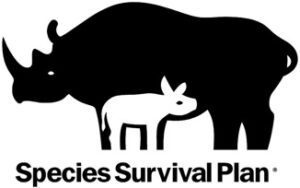
Species Survival Plans (SSPs)
The Saginaw Children’s Zoo participates in eight Species Survival Plans© (SSP), an AZA (Association of Zoos and Aquariums) cooperative breeding and conservation program. Working with other AZA organizations, we ensure healthy populations exist for:
- African Penguins (endangered)
- Cotton-Top Tamarins (critically endangered)
- Eastern Grey Kangaroos (least concern)
- Mexican Grey Wolves (critically endangered)
- North American River Otters (least concern)
- White-Throated Capuchins (under evaluation)
- Spotted Turtle (Endangered)
- Mexican Red-kneed Tarantula (Near Threatened)
